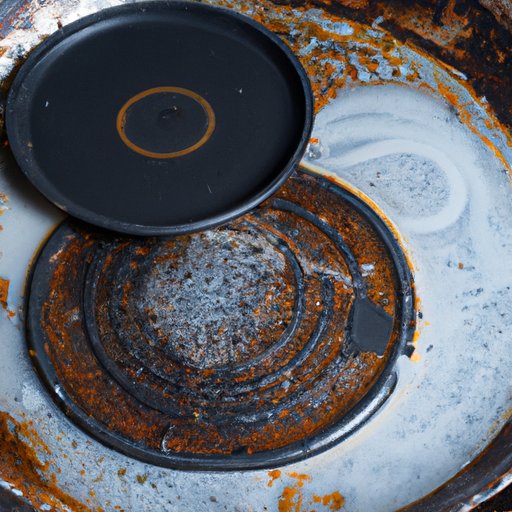Introduction
Cooking is an art, and burn’t pans are the bane of a cook’s existence. They can be incredibly hard to clean, especially if left for days, and can make cooking a less enjoyable experience. The good news is that it is possible to clean burnt pans, and in this article, we will share tips and tricks on how to do it.
Materials
There are several materials you can use for cleaning burnt pans. Many of these are likely already in your pantry. Baking soda is an excellent choice as it is an abrasive that won’t damage your cookware. Vinegar is another wonderful option to remove tough stains. If you need a commercial option, look for a cleaning agent specifically designed for cookware.
Methods
Depending on how bad the burn marks are on your pan, you may need to try several different cleaning methods. The first and easiest method is soaking the pan in warm water and dish soap for several hours or overnight. Scrubbing with a sponge or brush will be much easier once the burnt residue has loosened up.
If soaking does not work, you may want to try scrubbing with baking soda or salt, both of which are abrasive and won’t scratch your cookware. Another option is to fill the pan with water and add vinegar or baking soda. Bring the water to a boil and let it simmer for approximately 30 minutes. Then, let the water cool down, and use a scrubbing sponge or brush to remove any remaining marks.
For the stubborn burnt residue, a commercial cleaning formula may be required. If using a commercial cleaner, please be sure to use a soft sponge or brush to avoid damaging the pan’s surface.
Tips
Here are a few tips to make your cleaning process smooth and successful:
- Be patient: Burnt pans can take time to clean. It’s vital to have patience and keep at it until you get your pan looking great again.
- Use a non-metallic utensil while cleaning: Scraping your pan with any metallic material will cause scratches, which isn’t ideal. Be sure to use a soft brush or a silicone spatula or spoon to avoid this.
- Avoid using harsh chemicals: While you may be tempted to use harsh chemicals to speed up the cleaning process, they can be dangerous and harmful. Always opt for natural resources.
- Never preheat an empty pan: Preheating an empty pan will lead to it overheating and increase the risk of sticking food at the bottom of the pan.
- Hand wash them: Though most pans are dishwasher safe, cleaning a burnt pan requires gentle and deep attention, so hand washing is advisable.
Prevention
The best way to avoid dealing with burnt pans is by preventing them from happening in the first place.
- Use low to medium heat settings on the stove: High heat increases the risk of burning food and leaves tough marks on your pan.
- Don’t add cold water to a hot pan: Doing this will cause thermal shock and can warp the pan, leaving burnt residue and stains.
- Add water to the pan: Adding water, especially in the case of boiling and steaming vegetables or meat, can prevent burning, and it will make the food tender.
Conclusion
Burnt pans are a common problem in the kitchen, but they don’t need to be a cause for concern. With the methods and tips we’ve shared in this guide, you should be able to get your pan looking great in no time! Remember, the best prevention is always to practice safe cooking habits and take immediate action when something looks burnt.
FAQs
Q: Can I use steel wool on a burnt pan?
We would not advise you to use steel wool when cleaning your burnt pan, as it can scratch and damage its surface. Instead, opt for soft sponges and brushes, which will scruff off the residue without scratching your cookware.
Q: How can I get rid of stubborn burn marks?
If soaking the pan or scrubbing with baking soda and vinegar does not work, a commercial cleaner formulated specifically for burnt pans may be required. For successful cleaning with a commercial cleaner, we recommend following the manufacturer’s instructions and using a soft brush or sponge.
Q: Can I use a dishwasher to clean burnt pans?
While most pans can be washed in a dishwasher, a burnt pan would benefit from handwashing since it requires more attention and care to clean it effectively.
